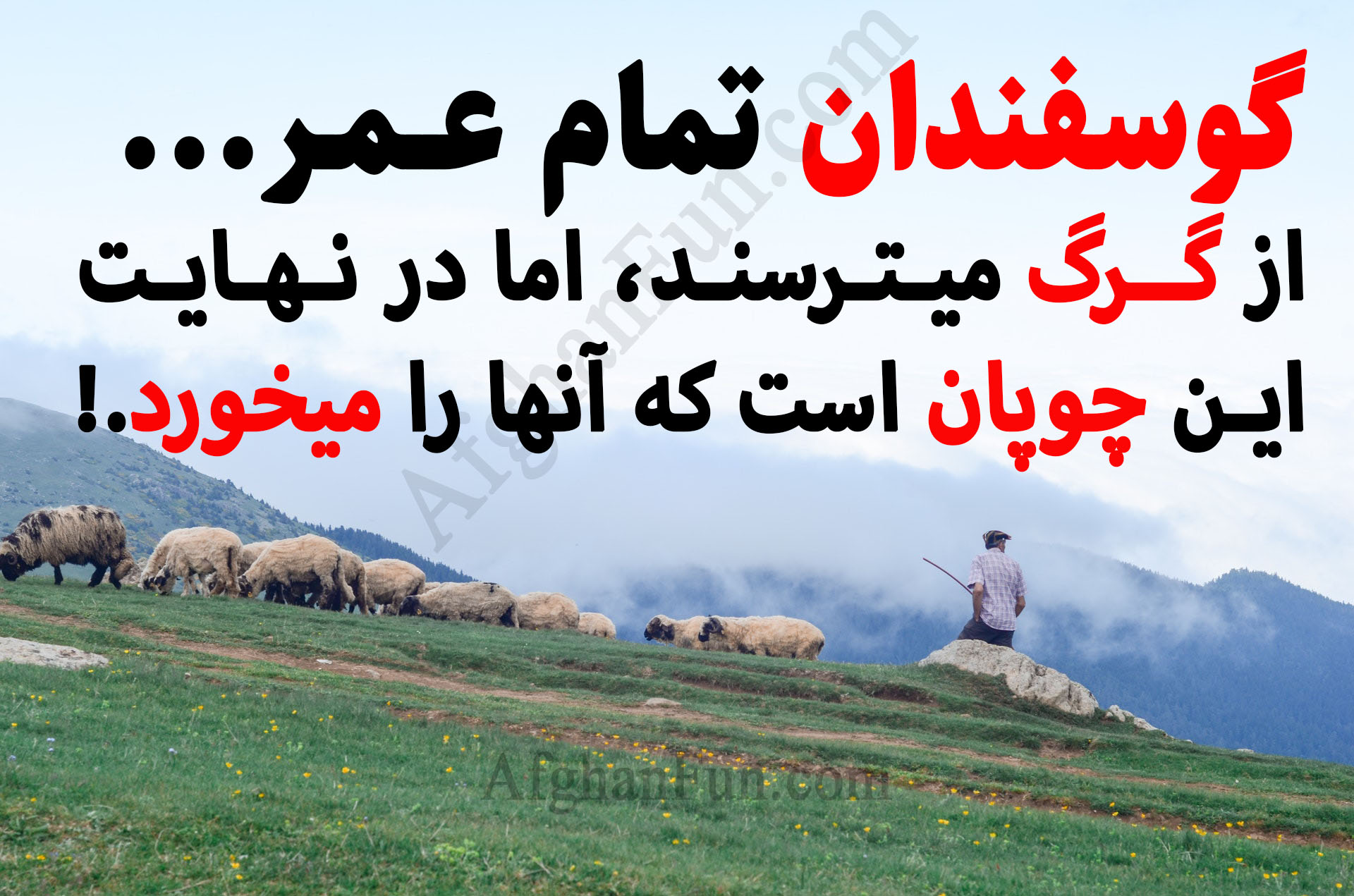
A sheep spends its whole life fearing wolves but eventually gets eaten by the shepherd.
African proverb?
گوسفند تمام عمرش را از گرگ میترسد، اما در آخر توسط چوپان خورده میشود.
ضرب المثل آفریقایی؟
این ضربالمثل به ما یادآوری میکند که گاهی اوقات، دشمنان نزدیکتر از آن چیزی هستند که فکر میکنیم. ما ممکن است وقت و انرژی خود را برای دوری از خطراتی که آشکار هستند صرف کنیم، اما غافل از اینکه خطر واقعی از جانب کسانی است که اعتمادمان را جلب کردهاند.
Гӯсфанд тамоми умраш аз гург метарсад, вале дар охир аз ҷониби чӯпон хӯрда мешавад.
Зарбулмасали африқоӣ?
Ин мақол нишон медиҳад, ки баъзан одамон вақти зиёдро барои тарсидан аз душманони ошкор сарф мекунанд, аммо хатар аз одамони наздик ё онҳое, ки ба онҳо бовар дорем, меояд.
الخروف يقضي حياته كلها في الخوف من الذئب، لكن يأكله الراعي في النهاية.
المثل الأفريقي؟
هذا المثل يعبر عن فكرة أن الإنسان قد يقضي حياته في الخوف من الأعداء الواضحين، بينما الخطر الحقيقي قد يأتي من أولئك الذين يثق بهم ويعتقد أنهم في صفه.
A Sheep’s Greatest Fear: The Irony of Fate
This proverb is a poignant reflection on the nature of fear, control, and exploitation. Here’s an analysis:
1. The Sheep and Its Fear
- The sheep represents the common person or the vulnerable. It spends its life in constant fear of external threats, symbolized by the wolves. The wolves, in this case, could represent visible dangers—things like societal or political oppression, enemies, or more immediate threats.
- The sheep’s fear is constant, yet it remains focused on the external danger, never realizing the more subtle but much greater danger that lies within its own environment.
2. The Shepherd
- The shepherd, in this metaphor, represents an authority or power that is supposed to protect and guide the sheep, but ultimately exploits them. The shepherd could symbolize a ruling class, government, or societal structures that claim to serve the public’s interests but, in reality, feed off the sheep’s labor, resources, or compliance.
- While the sheep fears the wolves, it’s the shepherd who ultimately brings about its demise. This suggests that the true threat isn’t always the obvious, external dangers, but rather the internal or systemic forces that hold power and control over the sheep, whether intentionally or as a byproduct of the established system.
3. The Irony of the Proverb
- There is a deep irony in the proverb. The sheep, despite all its fear of wolves, does not see the real threat: it is not the wolves that will ultimately consume it, but the shepherd—someone it trusts or at least believes is on its side. This irony points to how people or groups may focus on external threats or enemies while ignoring or being unaware of the more insidious, internal mechanisms of exploitation or control.
- The proverb also critiques how power structures maintain control over the vulnerable. The sheep’s attention is so diverted by the wolves (external threats) that it never sees the greater danger coming from the shepherd (the authority it trusts), leading to its inevitable downfall.
4. The Broader Implication
- On a societal level, the proverb suggests that individuals or groups may spend their lives focused on fears that are, to some degree, constructed or manipulated—such as national or ideological enemies—while the real danger comes from the structures of power that use these external threats to keep people in line or distracted from their true oppression.
- It’s a warning about the ways in which power can be exercised under the guise of protection, security, or benevolence, ultimately leading to exploitation.
5. Possible Political and Social Readings
- This proverb can be read as a commentary on political systems where governments or rulers convince the people to fear external enemies (the wolves), often exaggerating or creating those threats, while they themselves are the ones who profit from the people’s labor, obedience, or resources (the shepherd).
- It could also speak to the nature of authoritarian regimes where the populace fears outside threats, but the real danger lies in the hands of those who wield power over them domestically.
Conclusion
In essence, the proverb reflects on the human condition of fearing external dangers while overlooking the more profound risks from the systems that control, oppress, or exploit them. It’s a critique of the way in which power can manipulate fears to maintain dominance, and how individuals, unaware of the true nature of their oppression, may fall victim to those in positions of authority.











